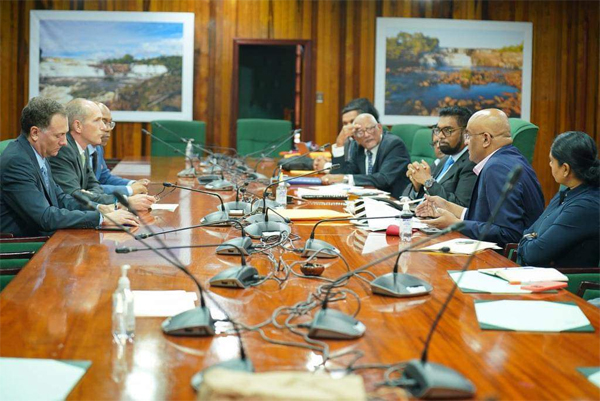
Kaieteur News
GEORGETOWN
Energiesnet.com 04 14 2023
The Government of Guyana (GoG) is prepared to challenge disputed costs claimed by ExxonMobil, to extract the resources in the Stabroek Block, through the process of international arbitration.
According to the contract, costs that have been flagged in an audit and deemed unacceptable can be recovered by the Contractor until the dispute is resolved.
Annex ‘C’ of the PSA at Section 1.5 (b) states “…In the event that an audit claim by the Minister is not settled to the Minister’s satisfaction by the Contractor’s reply as provided for above, the Contractor shall be entitled to recover any disputed amounts pending final resolution of the claim…”
The agreement also states that Exxon can provide reasons justifying the costs, but government would have to head to international arbitration to reclaim these sums. Upon the resolution of the issue, Guyana would be repaid with interest, if the country is successful in its challenge. However, all the legal fees incurred for both parties would be borne by the state.
Vice President Bharrat Jagdeo during a press conference on Thursday was asked if the government is prepared to tread this path to challenge such questionable costs.
In his response, Jagdeo explained, “Clearly if you have a dispute, if they are saying we believed we have supplied- so of the US$214 million that they have flagged in the audit- they only said that US$28 million should be removed from the cost bank and come over to the profit basically to be part of available for distribution as profits because they found that a significant part of Exxon’s supplies of goods and services were sole sourced. Almost 36 percent, but in the 36 percent that was sole sourced, they found that about US$28 million did not reflect industry standards where they were competitively sourced so that’s, we could have a dispute over the US$28 million. So Exxon may say no, that’s not true, so what happens if you have a dispute you have to go to arbitration process.”
Jagdeo pointed out that this process is key to breaking the deadlock between the two parties.
According to him, “We may have to strengthen that process but right now you would always have to have a dispute resolution process because if you have two parties that don’t agree based on audit and they say oh we believe it is competitively sourced, you have to do that.”
The VP also sought to highlight that the PSA makes provisions for the disputed costs to be repaid immediately after the resolution by the Contractor through its share of profit oil.
By signing the 2016 oil contract, Guyana has agreed to submit its dispute to the International Centre for the Settlement of Investment Disputes (ICSID) for arbitration before three arbitrators – pursuant to the Convention on the Settlement of Investment Disputes between States and Nationals of Other States. Research by this newspaper found that the institution was established in 1966 for legal dispute resolution and conciliation between international investors and States. It is parented by the World Bank Group.
To this end Jagdeo noted, “I believe its standard, almost every contract that you go to ICSID or you go to three arbitrators or a sole arbitrator. Almost any dispute, not just with oil companies, any international dispute with a foreign company you have to have those dispute resolution clauses so that’s how I see it.”
He said Guyana needs to make use of the international arbitration process, since the international companies operating in the country would not be willing to accept the ruling of the local Courts.
In fact, the VP said Guyana is presently utilizing this method of conflict resolution with the ‘Parking Meter’ scandal.
Biased PSA
While Guyana may have settled for its monies to be deducted by the oil companies and only be reclaimed through international arbitration, Trinidadian Energy Strategist, Anthony Paul in an exclusive interview with Kaieteur News said the recovery of costs in dispute are in keeping with the one-sided nature of the 2016 oil contract.
He explained that contracts generally allows for costs to be recovered only after the dispute has been settled. On the other hand, he also shared that the twin island has asserted its sovereignty in cost recovery by assigning the Minister responsible for Finance as the final arbiter in all matters related to taxation, including cost recovery.
As such, he noted, “The notion of having foreign courts of jurisdiction and arbitration is a slap in the face for sovereign nations, indicating that we are not to be trusted in making such decisions, even though they involve our own property. This is consistent with the way our people and resources have been seen and treated for centuries.”
To further strengthen the process, the expert noted that there are clear rules that guide the Ministers decision. He said, “The point I am making here is that there needs to be a series of things to complete the governance system, beyond laws, regulations and contracts, to include guideline, rules, procedures and so on. Trinidad has some but not all. The most significant gap in T&T is the lack of mechanisms for holding the regulators to account.”
To this end, Paul said where contracts leave room for ambiguity; clear regulations will close those gaps. He therefore urged, “So what should happen is that the Minister is the final arbitrator but there must be clear rules guiding him in making his decision and in how he reports to the people, who are owners of the resource he manages on their behalf.”
The specialist explained that oil companies very frequently attempt to force countries into international arbitration, fully cognizant of the fact that governments- like those in the Caribbean- cannot afford the process, so avoid it, even at a loss.
kaieteurnewsonline.com 04 14 2023












